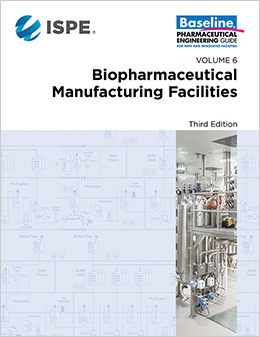Baseline Guide Vol 6: Biopharmaceutical Manufacturing Facilities 3rd Edition

Published: November 2023
Pages: 194
The biopharmaceutical industry has adapted to reflect available technologies such as single-use technologies and modular construction methodologies, products with more focused patient populations, evolving regulatory conditions, unrelenting pressures on costs, and increased focus on robust product supply while maintaining high-quality standards. This Guide presents concepts that reflect how these changes affect biopharmaceutical manufacturing facilities without sacrificing product quality, by reducing risk and enhancing the manufacturing control strategy.
This third edition of the ISPE Baseline® Guide: Biopharmaceutical Manufacturing Facilities intends to further reinforce the concepts described in the second edition of the Guide, provide examples of how these concepts can be put into practice, and detail the value and benefits of the approaches described. In addition, this revision includes new topics and details regarding Quality Risk Management (QRM), Contamination Control Strategies (CCS), and the impact of closed processes on facility design.
The globally recognized concepts around product protection, driven by aseptic and low bioburden practices and closed system designs, provide the foundation for a risk-based approach that examines the relationship between product, process, and facility. This Guide is intended to provide individuals and teams with the tools to make informed decisions about layouts, area classifications, segregation strategies, project delivery approaches, and operational approaches, all aimed at creating compliant, cost-effective biomanufacturing facility assets.
Guide Core Team
For the full list of contributors to this Guide see Guidance Document Teams
Emerging Economy Publication Discount
ISPE members located in nations with emerging economies* are eligible for a 50% discount on publications from the regular member price. To receive the discount, members must be logged in with their ISPE member account. Contact Member Services at ask@ispe.org for more information or if you have questions about your membership status or this discount program. Discounts do not apply to Techstreet document downloads.
*Based on the World Bank's system for classifying national economies by GNI per capita. Includes low-income, lower middle-income, and upper middle-income economies. To learn more about the World Bank classification system, please click here. Currently includes the following nations, except where international sanctions apply:
- Afghanistan
- Albania
- Algeria
- Angola
- Argentina
- Armenia
- Azerbaijan
- Bangladesh
- Belarus
- Belize
- Benin
- Bhutan
- Bolivia
- Bosnia and Herzegovina
- Botswana
- Brazil
- Bulgaria
- Burkina Faso
- Burundi
- Cabo Verde
- Cambodia
- Cameroon
- Central African Republic
- Chad
- China
- Colombia
- Comoros
- Congo, Dem. Rep.
- Congo, Rep.
- Costa Rica
- Côte d’Ivoire
- Cuba
- Djibouti
- Dominica
- Dominican Republic
- Ecuador
- Egypt, Arab Rep.
- El Salvador
- Equatorial Guinea
- Eritrea
- Eswatini
- Ethiopia
- Fiji
- Gabon
- Gambia, The
- Georgia
- Ghana
- Grenada
- Guatemala
- Guinea
- Guinea-Bissau
- Haiti
- Honduras
- India
- Indonesia
- Iran, Islamic Rep.
- Iraq
- Jamaica
- Jordan
- Kazakhstan
- Kenya
- Kiribati
- Korea, Dem. People's Rep.
- Kosovo
- Kyrgyz Republic
- Lao PDR
- Lebanon
- Lesotho
- Liberia
- Libya
- Madagascar
- Malawi
- Malaysia
- Maldives
- Mali
- Marshall Islands
- Mauritania
- Mauritius
- Mexico
- Micronesia, Fed. Sts.
- Moldova
- Mongolia
- Montenegro
- Morocco
- Mozambique
- Myanmar
- Namibia
- Nepal
- Nicaragua
- Niger
- Nigeria
- North Macedonia
- Pakistan
- Palau
- Papua New Guinea
- Paraguay
- Peru
- Philippines
- Russian Federation
- Rwanda
- Samoa
- São Tomé and Príncipe
- Senegal
- Serbia
- Sierra Leone
- Solomon Islands
- Somalia
- South Africa
- South Sudan
- Sri Lanka
- St. Lucia
- St. Vincent and the Grenadines
- Sudan
- Suriname
- Syrian Arab Republic
- Tajikistan
- Tanzania
- Thailand
- Timor-Leste
- Togo
- Tonga
- Tunisia
- Türkiye
- Turkmenistan
- Tuvalu
- Uganda
- Ukraine
- Uzbekistan
- Vanuatu
- Vietnam
- West Bank and Gaza
- Yemen, Rep.
- Zambia
- Zimbabwe









